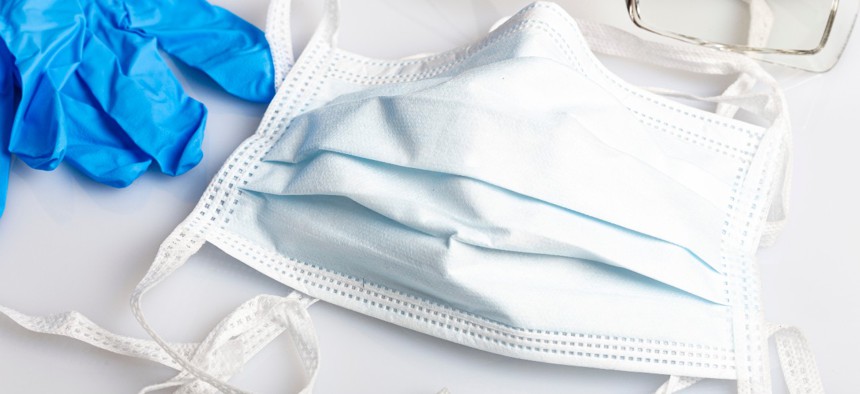
By Natale Zanardi / Shutterstock.com
Pandemic Oversight Committee Launches Contract Spending Tracker
The committee had stated in its first report that financial management could be a top challenge for agencies.
The pandemic oversight committee on Tuesday launched an online tool to track the federal government’s contract spending.
The Pandemic Response Accountability Committee, established by the $2.2 trillion CARES Act, is one of the various entities overseeing the government’s response to the novel coronavirus pandemic and is composed of 21 inspectors general. The relief package appropriated an unprecedented amount of money, so there has been increased pressure to ensure the funds are not misspent. As of Tuesday, the federal government has committed to 7,474 contracts with 4,115 vendors and spending of $15.9 billion, according to ProPublica.
“Users can download the entire dataset to conduct their own analysis by examining contracts by category – for example medical services and equipment, janitorial services for government buildings, and personal protective equipment and safety supplies for government workers,” said the committee. There is also “an interactive map for users to explore the total amount of contract spending by state and county.”
The committee is using numbers from the Federal Procurement Data System to track the spending and will update the tracker weekly. The committee noted that contract documents aren’t usually made public because of their proprietary information, but individuals can try to obtain them through Freedom of Information Act requests.
In its first report issued last week, the committee identified financial management as one of the top management challenges federal agencies could face during their response efforts. “Even in non-pandemic times, issues ranging from a lack of reliable financial data to deficiencies in agency internal controls limit the ability of inspectors general to fulfill this mission,” said the report. “These concerns are heightened by substantial increases in the amount of money allocated for certain programs and the expedited timetable for distribution of CARES Act and other pandemic-related funds.”
For example, based on past experience and the current risk-analysis, “protecting funds” is one of the top challenges for the Health and Human Services Department, which is the top contract spender, according to ProPublica. “Responsible stewardship, transparency and accountability of HHS funds are needed to ensure that HHS beneficiaries and the American public receive the true benefit of this substantial investment,” the committee said in its report. “Effective internal controls and the collection, maintenance and analysis of relevant data are key to ensuring that funds meet their intended purposes.”
The oversight committee also said the Homeland Security Department’s long-term weaknesses with procurement internal controls could “hinder [its] ability to ensure proper financial planning, payments, and internal controls related to CARES Act funding [as] COVID-19 procurements will be wide and vast.” The Federal Emergency Management Agency, part of the Homeland Security Department, is another top contract spender.
Lawmakers have made similar observations to the committee about the federal government’s contracting processes.
On Monday, House Energy and Commerce Committee members wrote to the Trump administration with questions about its oversight and coordination of coronavirus-related procurement. Some federal agencies “reportedly encountered challenges in reliably securing critical medical supplies and dealing with questionable suppliers during the pandemic,” they wrote. “For instance, the Indian Health Service reportedly awarded a $3 million contract to supply respirator masks to Navajo Nation hospitals to an individual who created a medical supply company less than two weeks before receiving the award, but possessed no prior federal contracting experience.”
Also, Rep. James Clyburn, D-S.C., chairman of the Select Subcommittee on the Coronavirus Crisis, and Rep. Carolyn Maloney, D-N.Y., chairwoman of the House Oversight and Reform Committee, asked HHS on June 2 for information on its coronavirus research contracts with private companies. “We are seeking to determine whether these contracts include provisions to ensure affordability and prevent profiteering,” as well as ensure “the American people can learn how these taxpayer dollars are being spent.”
They set a June 16 deadline for their requested information and asked for a staff briefing by June 19. Clyburn’s office has yet to respond on whether or not this occurred.
“We have received a number of letters from Congress on COVID-19, and the department is working to respond,” an HHS spokesperson told Government Executive on Tuesday. “We continue to maintain an open line of communication with members of Congress, including briefings for members of both the House and Senate, while helping coordinate the response to the public health emergency.”
The Trump administration also signaled in April guidance that transparency of spending is important, despite some reports indicating otherwise. The memo outlined guidelines on how to quickly distribute relief funds, while also ensuring transparency and accountability to protect taxpayer dollars.







